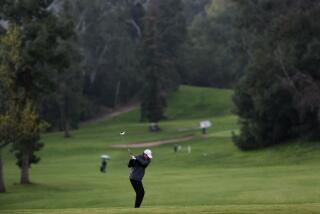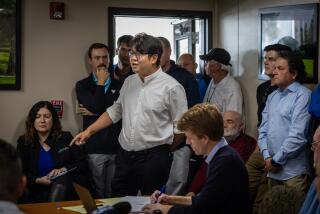All He Asks Is for the County to Play Through
- Share via
MIAMI — Only Kenny Bethel may know with certainty when he first set foot on the grounds of Palmetto Golf Course. It may have been 40 years ago. Or, perhaps, a decade ago, after a hurricane pounded many residential neighborhoods south of Miami to splinters.
What is undisputed is that for years, the greens and fairways of Bermuda grass have been home to the Miami native. He sleeps by the outdoor toilets, combs the rough for lost golf balls and warily watches the waterways for alligators and poisonous water moccasins.
For a bag of 80 retrieved balls, Bethel says, he can earn $20. He and his companion of nine years, Frances, buy food in the Burger King and other fast-food eateries on U.S. 1 just east of the course. In the cooler weather of winter, the couple wash in gas station restrooms. When it warms up, they shower in the golf course sprinklers.
Bethel, who will turn 56 next month, says that since his stepfather kicked him out of their home on Christmas Day 1963 at age 15, the Palmetto Golf Course has been his sole residence. He says the only time he has been absent is during two tours of duty in Vietnam.
“When I’d get leave, I’d come here,” says the golf course squatter. “I had nowhere else.” But he becomes vague when asked for details about his Vietnam service. His identification documents and personal papers, he says, blew away in a hurricane.
What to do with this uninvited lodger and entrepreneur has bedeviled Miami-Dade County parks officials for years, and it recently blew up into a public relations nightmare. Players and homeowners were complaining with increasing frequency about him trespassing on the public course, says Carlos McKeon, county manager of golf operations. Women expressed unease about a man loitering near the bathrooms. A homeowner threatened to take the issue to the county commission.
Late last year, McKeon says, Bethel was informed by course managers that they had no choice but to “get him out of here.” Around Christmas, groundskeepers started locking the bathrooms at night to keep Bethel and Frances from sleeping inside, as had been their practice. Bethel says he has been told not to come onto the course before 5:30 p.m.
“But it’s too dark to see balls in the water then,” he objects. “How I am going to eat?”
With his ball-gathering capacity cut drastically -- from three bags a day to one, he says -- Bethel counterattacked. He told a golfer whose wife was a newspaper reporter about the new restrictions on him, and the result was an article this month that claimed -- not accurately, according to county officials -- that after four decades of living at Palmetto, he had suddenly been evicted.
Television and radio reporters made the trip from Miami to meet him, and he became a local celebrity. Many patrons of Palmetto took his side. For them, Bethel was not just another face among the more than 4,400 men and women known to live outdoors in Miami-Dade County, but “Kenny,” a familiar fixture, even a friend. In his current troubles, Bethel boasts, he has golfing judges and lawyers to advise him.
As the reedy 6-foot-7 Bethel, his matted dreadlocks spilling from under a blue baseball cap, waited one recent afternoon to sell a bag of balls by the tee of the fourth hole, Greg Isom, golfing coach at South Dade High School, walked up and gave him a bearhug. “I don’t know what’s happening, but I’m praying for you,” Isom tells Bethel.
“He sells balls to my kids, helps them out with their swing,” Isom says. “He doesn’t harm anybody.”
“Just about everybody you see here out on this field knows me,” Bethel says. As the coach tees off, Bethel observes that he has hooked the ball toward the water.
He used to play golf too, but that was before someone stole the clubs he kept under a bridge, Bethel says. As he tells it, he found his role in life at 15, when heartbroken at not getting the roller skates he wanted for Christmas, he walked from his home nearby to the course and began picking up golf balls he found. A golfer bought them for $25 or $30, and he was able to purchase his own skates. His stepfather was incensed, Bethel says, and kicked him out of the house. It was then, he says, that he came to live on the 18-hole, par-70 course designed by links architect Dick Wilson.
“The rangers used to chase me. Black people couldn’t play out here then, let alone stay here,” Bethel says. “But I stayed here.”
When Hurricane Andrew carved a path of destruction through South Florida in August 1992, Bethel says, he safely holed up in the course’s sturdily built bathrooms. The storm, which killed 23 people, had a silver lining, he says: Violent winds dislodged 2,800 golf balls that were stuck in the fronds of date palms.
It’s possible Bethel has been selling the balls he gathers at Palmetto for decades, say county officials, but no one can remember him living on the course before Andrew. According to the letter of the law, they say, he is a trespasser and has no right to conduct business without a permit. At least 25 times over the years, McKeon says, employees have called police to take Bethel away for trespassing. But he has always returned.
To regularize his presence, course officials last year offered Bethel a grounds keeping job at $10.30 an hour. He turned it down because he is too old to dig holes and he can make more selling balls, Bethel says.
“We have been compassionate. We have tried to help him,” McKeon says. “We used to tell him to hide when he saw us coming, so no one would see that he was here.”
News reports about Bethel’s situation have sparked e-mail protests from around the country about unfeeling government bureaucrats, says Yvonne McCormack-Lyons, communications manager for Miami-Dade parks. She attributes the strong emotions to concern about the homeless.
At least some of the blue-shirted course staff members who patrol in golf carts also seem to be on Bethel’s side, regardless of what their bosses may order. “When I see him, I’m supposed to tell him to get off,” says one staff member, speaking on condition of anonymity. “But I don’t care.”
“This whole golf course is my yard,” Bethel says. “I’m here more than they are.”
He knows the course so well, Bethel says, he can walk the entire property blindfolded without bumping into a palm or ficus tree or falling in the water. And he knows golfers. The ball most coveted by his customers, he says, is the Titleist Pro V1.
He is happy with the unusual place he has chosen in Florida’s sun and vows to fight to keep it. But he acknowledges that he has had to make changes of late. He and Frances now hide their bedding and other belongings under a bridge and sleep in a little alleyway by the course bathrooms at night.
Though he defies county officials by still venturing during daylight hours onto the links to hunt for lost balls and golfers to buy them, he now insists that Frances wait on the other side of the fence with a teddy bear to keep her company. He is willing to risk arrest, but he does not want her to.
“If the police want to put me in jail, I’d be back in a few hours,” Bethel says. “If somebody gets tired of this, it’s not going to be me.”


